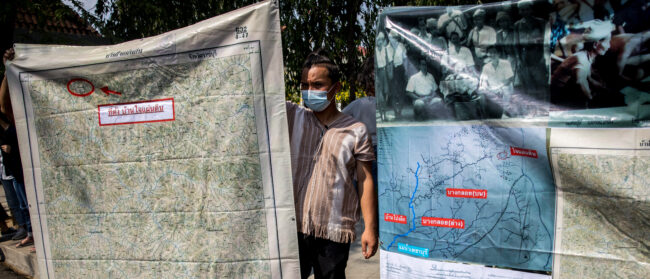Additional reporting by Samphors Sao
Down a narrow alley on the outskirts of Phnom Penh, nearly invisible to the chaos of motos and tuk tuks in the street, Ratana and her neighbours get ready for work. In contrast with rush hour outside, the women quietly go about their routines: brushing hair, boiling water on the fire, chatting to the shopkeeper.
But rather than the darkening sky of dusk to cover the ambiguous legality of their jobs as sex workers, the city is just now waking up. Working at night, they say, is only for the most desperate times.
“I go stand there [at Wat Phnom] two times a day, morning and afternoon,” said Ratana, who’s been in the industry for about 10 years.
“I’m afraid the district authorities will arrest us, I heard they will send us to Prey Speu,” she added, referring to the all-encompassing detention centre where many drug users are sent.
It wasn’t always like this. With the closure of KTVs and massage parlours in Cambodia for prolonged stretches over the past 18 months, the women have no choice but to take their work to the street. This has increased the risk of police harassment and bribery, violence with clientele, as well as resulted in less regular income and even poorer access to health services as they fend for themselves.
In this Globe mini-documentary, reporters spoke with three women who turned to working at Wat Phnom when their former places of employment, including beer houses and massage parlours, were closed early last year in a mandate by the Ministry of Tourism. Today, with an ongoing outbreak since April this year, adult entertainment venues remain largely closed.
Organisations such as FHI 360 and Cambodian Women for Peace and Development, both of which provide assistance to these women in the form of HIV testing and other services, said this move to the streets complicates many facets of their lives.
The biggest impact on freelance entertainment workers during Covid-19 is they all face transmitting Covid-19 while they go out with clients
The threat of being placed in Prey Speu is certainly frightening, but Chheav Aphyra, Cambodian Women for Peace and Development Senior Project Coordinator, says that this is just one risk these women face.
“The biggest impact on freelance entertainment workers during Covid-19 is they all face transmitting Covid-19 while they go out with clients,” Aphyra said. “They also face financial crisis because this time they couldn’t earn any money to support their family, while some have six to eight members in the family.”
Among their other concerns as they are forced to work independently are customers who don’t pay, who are aggressive and drunk, and security guards and police, whose presence signals the end of their work day and forfeiting a day’s wage.
A June 2020 study by the Women’s Network for Unity, a 6,000-member Phnom Penh-based sex workers union, looking at the industry during Covid-19 revealed that 93% of women had faced significant impact to their livelihoods. The study showed that 17% of 130 sex workers interviewed had moved into freelance work following the closure of KTVs and beer gardens, while 45% of the women had no work to fall back on and were unemployed.
While a year has passed since the study, Polet Pech, WNU’s director, said these women are today facing even more extreme circumstances, such as increased debt.
“The previous research is still relevant, just the situation is getting worse,” Polet told the Globe last week. She added that because KTVs and bars often didn’t officially employ these entertainment workers, many weren’t eligible for the same government allowance provided to tourism and garment workers by the Ministry of Labour.
The industry is generally more cutthroat since the pandemic, says Polet. As KTVs remain shut, those who moved to freelance work are looking at increased competition and a lower wage.
“The clients are decreasing, the number of freelance sex workers is increasing,” she said.
Pushed to open spaces like popular sex worker hot spot Wat Phnom and other parks, the women are encountering new challenges to their lives brought on by Covid-19 and lockdown. All three had been in quarantine for two weeks, unable to work, after testing positive following a community outbreak, which took a serious toll on their ability to make a living.
“Before Covid, we could find one to two customers a day. But after Covid, we can’t earn any money,” said Pov Ron, who lives with Ratana and also works at Wat Phnom.
“We can’t find any customers because they are afraid of Covid.”


